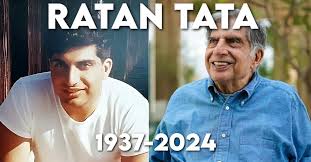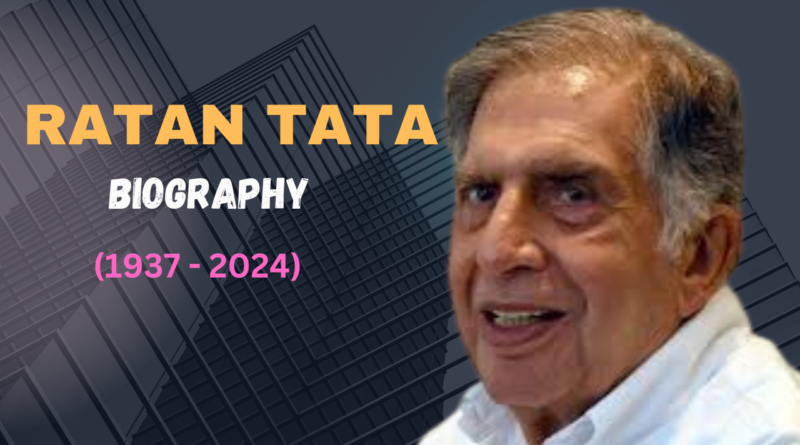Ratan Tata Biography: Birth, Age, Education, Family, Successor, Net Worth, Awards, Lessons, and More
Ratan Tata is one of the most iconic and influential business leaders in the history of India. As the former Chairman of the Tata Group, a conglomerate with a global footprint, he transformed the company from a primarily domestic operation into an internationally renowned enterprise. Ratan Tata’s leadership is characterized by vision, integrity, and a deep commitment to ethical practices. This article provides a comprehensive look at his life, achievements, and lasting impact on the business world.
Early Life and Family Background
Ratan Naval Tata was born on December 28, 1937, in Mumbai, India, into one of the most prominent families in the country. He is a member of the Tata family, the founders of the Tata Group, which is considered India’s largest and most diversified conglomerate.
The Tata Family Legacy
The Tata family’s legacy dates back to the mid-19th century with Jamshedji Tata, the family Male Dominance who established the Tata Group in 1868. The company initially started as a trading firm and later expanded into textiles, steel, and other industries. Jamshedji Tata is widely credited for his vision of industrializing India, and his values of integrity, social responsibility, and a commitment to nation-building have spread through every generation of the Tata family.
Ratan Tata’s Parents and Early Life Challenges
Ratan Tata’s father, Naval Tata, was an adopted son of Sir Ratanji Tata, who himself was a key figure in shaping the Tata Group. His mother, Sooni Tata, came from a middle-class background. Ratan Tata’s childhood, however, was marked by personal disruption. His parents separated when he was 10 years old, and he was subsequently raised by his grandmother, Lady Navajbai Tata. Despite the emotional challenges, Ratan’s upbringing in the Tata household was one that instilled discipline, humility, and a strong sense of responsibility.
Education and Early Career
Ratan Tata’s educational background laid the foundation for his future leadership roles. He attended the Campion School and Cathedral and John Connon School in Mumbai before moving to the United States for his higher education.
Cornell University and Architectural Studies
Ratan Tata earned his B.S. in Architecture from Cornell University in 1962. Although he initially studied architecture, his passion for design eventually became overshadowed by his interest in business and leadership. His time at Cornell also gave him a broader perspective on global business practices and allowed him to form connections that would later serve him well in his international ventures.
Harvard Business School and the Advanced Management Program
In 1975, Ratan Tata completed the Advanced Management Program at Harvard Business School. This prestigious program further sharpened his leadership skills and provided him with the tools to manage and expand a large, diversified company like the Tata Group.
Joining Tata Group and Early Career
Ratan Tata joined the Tata Group in 1962 after returning from the United States. His first assignment was at Tata Steel, where he worked on the shop floor, handling steel production and learning the nuances of the business from the ground up. This hands-on experience was crucial in shaping his understanding of the industry and gave him insight into the operational challenges that workers faced.
Leadership Style and Early Contributions
In the early stages of his career, Ratan Tata exhibited a leadership style that was marked by humility, a willingness to learn, and a deep commitment to the welfare of employees. He believed that the strength of the Tata Group lay in its workforce, and he made employee welfare one of his key priorities during his time at Tata Steel.
In the 1970s and 1980s, Ratan Tata held various roles within the Tata Group’s diverse operations. He proved himself in various leadership positions, managing companies like Tata Motors and Tata Industries. His work during this period set the stage for his eventual rise to the top of the conglomerate.
Becoming Chairman of Tata Group
In 1991, Ratan Tata succeeded J.R.D. Tata as the Chairman of Tata Sons, the holding company of the Tata Group. His ascension to the leadership role came at a time when India was undergoing significant economic reforms, with liberalization opening the country to foreign investment and competition. Ratan Tata faced the enormous task of transforming the Tata Group into a globally competitive conglomerate.
Challenges in the Early 1990s
Ratan Tata’s early years as Chairman were marked by several challenges. Many of the companies within the Tata Group were operating as independent entities, with little synergy or coordination between them. Additionally, some senior leaders within the group were resistant to change, preferring the status quo over Ratan Tata’s vision of a more unified and streamlined operation.
Ratan Tata addressed these challenges by restructuring the Tata Group. He consolidated the various businesses under the umbrella of Tata Sons, introduced modern management practices, and emphasized innovation and efficiency. His leadership was transformative, though not without controversy, as some senior executives resisted his changes.
Key Acquisitions and Global Expansion
One of Ratan Tata’s most significant contributions was his focus on global expansion. Under his leadership, the Tata Group made several key acquisitions that extended the company’s footprint beyond India.
- Tata Tea’s Acquisition of Tetley Tea (2000): This acquisition marked Tata Group’s first major international foray. The $450 million deal made Tata Tea one of the largest tea companies in the world.
- Tata Motors Acquires Jaguar Land Rover (2008): Perhaps the most iconic acquisition under Ratan Tata’s leadership was the purchase of Jaguar Land Rover from Ford for $2.3 billion. Despite skepticism about the deal at the time, Jaguar Land Rover turned into one of Tata Motors’ most profitable businesses, thanks to effective management and a focus on innovation.
- Tata Steel’s Acquisition of Corus (2007): In another landmark deal, Tata Steel acquired Corus, a European steel giant, for $12 billion. This acquisition helped Tata Steel become the fifth-largest steel producer in the world.
Ratan Tata’s ability to navigate these complex international acquisitions demonstrated his vision of transforming the Tata Group into a global powerhouse.
Ratan Tata’s Legacy and Successor
Ratan Tata retired as Chairman of Tata Sons in 2012, marking the end of an era. However, his legacy continues to influence the Tata Group and Indian industry as a whole. His contributions to the global expansion of the Tata Group, his emphasis on ethical leadership, and his focus on employee welfare have left an remarkable mark.
Cyrus Mistry and Leadership Transition
Ratan Tata played a pivotal role in selecting Cyrus Mistry as his successor. Mistry, who hailed from the Shapoorji Pallonji family, which owned a significant stake in Tata Sons, was appointed as Chairman in 2012. However, Mistry’s tenure was fraught with disagreements with the Tata Group’s board, leading to his removal in 2016. During the interim period, Ratan Tata returned as Chairman to guide the company through the leadership transition.
Natarajan Chandrasekaran: The New Chairman
In 2017, Natarajan Chandrasekaran, the former CEO of Tata Consultancy Services (TCS), was appointed as Chairman of Tata Sons. Chandrasekaran’s focus on digital transformation, innovation, and sustainability has been in line with Ratan Tata’s long-term vision for the group.
Net Worth and Philanthropy
While the Tata Group is worth over $100 billion in revenues, Ratan Tata’s personal net worth is relatively modest, estimated at $1 billion. This is primarily due to the fact that 66% of Tata Sons’ equity is owned by charitable trusts, including the Sir Ratan Tata Trust and the Sir Dorabji Tata Trust. These trusts support numerous causes, including education, healthcare, and rural development.
The Tata Trusts: A Commitment to Philanthropy
Ratan Tata’s philanthropic efforts are primarily channeled through the Tata Trusts, one of India’s oldest and largest philanthropic organizations. His focus on social responsibility has driven significant investments in healthcare, education, and rural development. Some notable initiatives include:
- Tata Memorial Hospital: One of India’s leading cancer research and treatment centers.
- Tata Institute of Fundamental Research: A world-class research institution.
- Tata Institute of Social Sciences (TISS): A premier institution in social sciences and social work.
Ratan Tata has also made significant contributions to disaster relief efforts, rural poverty alleviation, and access to clean drinking water.
Awards and Recognition
Ratan Tata’s contributions have earned him numerous accolades and honors both in India and internationally. Some of the most prestigious awards include:
- Padma Bhushan (2000): One of India’s highest civilian honors.
- Padma Vibhushan (2008): The second-highest civilian award in India.
- Honorary Knight Commander of the Order of the British Empire (2009): In recognition of his contributions to UK-India relations.
- Honorary Doctorates from several prestigious institutions, including Cornell University, Ohio State University, and the London School of Economics.
Business Philosophy and Ethical Leadership
One of the most defining aspects of Ratan Tata’s leadership is his commitment to ethical business practices. He has always maintained that profits and principles can coexist, a view that has guided his actions and decisions throughout his career. Under his leadership, the Tata Group has consistently upheld the highest standards of integrity, even in the face of adversity.
Standing by Values
An often-cited example of Ratan Tata’s ethical stand is his refusal to engage in corrupt practices during the controversial 2G Spectrum Scandal in India. When asked why the Tata Group didn’t attempt to bribe government officials to secure licenses, Tata famously responded that compromising on values was never an option for him or his company. This unwavering commitment to ethics, even at the expense of short-term gains, has cemented his reputation as a principled business leader.
Employee Welfare and Inclusivity
Ratan Tata is also known for his deep concern for employee welfare. He believes that the success of any organization lies in the strength and well-being of its workforce. This belief has manifested in several employee-centric policies within the Tata Group, such as comprehensive health benefits, educational opportunities, and housing initiatives. One of the most noteworthy examples of this is Tata Motors’ decision to provide housing for its employees in Jamshedpur, one of the group’s industrial hubs.
Inclusivity is another area where Ratan Tata has left a lasting impact. He has been a champion for diversity in the workplace and has always encouraged the hiring and promotion of women and minorities within the Tata Group. This focus on inclusivity has helped foster a corporate culture that values people from all walks of life.
Ratan Tata’s Vision for Indian Industry
Ratan Tata has long advocated for Indian businesses to compete on the global stage. His acquisitions of foreign brands like Tetley, Jaguar Land Rover, and Corus reflect his belief that Indian companies should aim for global leadership. However, his vision for Indian industry goes beyond profit and market share. Tata has always emphasized the importance of innovation, quality, and social responsibility in building a sustainable business.
The Nano Project: A Vision for Affordable Mobility
One of Ratan Tata’s most ambitious projects was the development of the Tata Nano, a car that aimed to provide affordable transportation for millions of Indian families. Introduced in 2008, the Tata Nano was marketed as the world’s cheapest car, with a base price of ₹1 lakh (approximately $2,000). The project was driven by Tata’s desire to make safe and affordable mobility accessible to the Indian middle class.
Although the Nano did not achieve the commercial success that was originally envisioned, it remains a testament to Ratan Tata’s belief in disruptive innovation and his commitment to improving the lives of ordinary people. The project also highlighted his ability to think big and tackle seemingly insurmountable challenges.
Promoting Sustainability and Green Innovation
Ratan Tata has always been ahead of his time when it comes to sustainability. Long before corporate social responsibility became a buzzword, the Tata Group was investing in renewable energy, reducing its carbon footprint, and developing environmentally friendly products. Under Ratan Tata’s leadership, companies like Tata Power have invested heavily in renewable energy, including solar and wind power. Tata Motors, meanwhile, has focused on developing eco-friendly vehicles, including electric cars and trucks.
Ratan Tata’s focus on sustainability is not just about reducing environmental impact but also about ensuring that businesses can thrive in the long term. His approach reflects a holistic understanding of business, where success is not measured solely in terms of profits but also in terms of the company’s contribution to society and the planet.
Personal Life: A Humble, Private Leader
Despite his immense success and global recognition, Ratan Tata is known for leading a simple and private life. He has never married, and much of his personal life remains out of the public eye. Those close to him describe him as a deeply humble individual who values relationships, loyalty, and kindness over material wealth and power.
Ratan Tata’s lifestyle is a stark contrast to many other business magnates. He has often been seen driving himself around Mumbai in his modest Tata Indigo or Tata Nano cars, further underlining his unpretentious nature. His humility and grounded personality have earned him respect across all sections of society, from top industrialists to common citizens.
Animal Lover and Advocate
A lesser-known aspect of Ratan Tata’s life is his deep love for animals, particularly dogs. He has been a passionate advocate for animal welfare and has adopted several stray dogs over the years. His residence in Colaba, Mumbai, is well-known for being home to many rescued dogs, and he often shares posts on social media promoting the adoption of stray animals. In line with his passion, Tata Trusts has also supported various animal welfare initiatives across India.
Ratan Tata’s Influence on the Next Generation of Leaders
One of Ratan Tata’s lasting legacies is his influence on the next generation of business leaders in India and abroad. His leadership style, which combines visionary thinking with a strong ethical compass, has inspired countless young entrepreneurs and business leaders. Many look up to him not just for his business acumen but also for his moral values and his commitment to making the world a better place.
Mentoring Startups and Young Entrepreneurs
In recent years, Ratan Tata has taken on a new role as a mentor and investor in Indian startups. He has provided funding and guidance to several promising ventures, particularly in the technology and e-commerce sectors. Some of the startups he has invested in include Ola, the ride-hailing service, Snapdeal, an e-commerce platform, and Urban Ladder, a furniture retailer. His involvement has not only provided financial backing but also valuable insights and mentorship to young entrepreneurs.
Ratan Tata’s role in supporting startups reflects his belief in innovation and entrepreneurial spirit. He has often spoken about the need for disruptive technologies to solve real-world problems, and his support for the startup ecosystem is a testament to his forward-thinking approach.
ALSO READ: The Reality of Wealth and Happiness: Lessons from Billionaires
Lessons from Ratan Tata’s Leadership
Ratan Tata’s life and career offer several key lessons that can inspire both individuals and organizations:
1. Integrity Is Non-Negotiable
Throughout his career, Ratan Tata has demonstrated that integrity is the cornerstone of long-term success. His refusal to engage in unethical practices, even when it meant losing business opportunities, has set a high standard for corporate governance in India. Tata’s belief that businesses must operate with honesty and transparency remains one of the defining principles of his leadership.
2. Be Bold but Responsible
Ratan Tata has always been a risk-taker, whether it was acquiring global brands like Jaguar Land Rover or launching innovative products like the Tata Nano. However, his bold decisions were always tempered by a strong sense of responsibility towards society, employees, and shareholders. His ability to balance risk-taking with responsibility is a lesson for any leader looking to drive innovation while maintaining long-term sustainability.
3. Focus on People
Ratan Tata’s leadership style places a strong emphasis on the well-being of employees. He understands that a company’s success is intrinsically linked to the welfare of its people. Tata’s employee-centric policies, his focus on inclusivity, and his commitment to empowering women and minorities demonstrate that people should always come first in any organization.
4. Give Back to Society
For Ratan Tata, business success is only meaningful if it improves the lives of others. His dedication to philanthropy, through the Tata Trusts and other charitable initiatives, highlights the importance of corporate social responsibility. The lesson here is that businesses must not only focus on profits but also on contributing to the betterment of society.
5. Stay Humble
Despite his vast achievements, Ratan Tata remains a humble individual who shuns the limelight and leads a simple life. His humility and down-to-earth nature serve as a reminder that success should not lead to arrogance. Staying grounded, even in the face of monumental success, is a quality that endears Ratan Tata to millions of people around the world.
Ratan Tata Passes Away: A Great Loss to India and the Global Business Community

Ratan Tata passed away at Breach Candy Hospital in Mumbai, where he had been admitted following a sudden drop in blood pressure. Initially, on October 7, he had assured the public that he was undergoing routine health check-ups due to his age, but his condition worsened, leading to his transfer to the ICU. Tributes have since poured in from all corners, with industrialist Harsh Goenka expressing condolences on social media, calling Tata a “beacon of integrity” and acknowledging his significant influence on both business and society.
Recently, Ratan Tata had addressed public concerns about his health, explaining that he was undergoing routine medical evaluations related to age. His passing marks a momentous loss for Indian industry. Ratan Tata was not only a pivotal figure in the rise of the Tata Group, but also a revered philanthropist, known for his ethical leadership and unwavering dedication to social causes.
Here are some famous quotes attributed to Ratan Tata, reflecting his wisdom, leadership, and ethical principles:
- “I don’t believe in taking right decisions. I take decisions and then make them right.”
- This highlights Tata’s focus on action and responsibility, emphasizing the importance of learning and adapting as you move forward.
- “Take the stones people throw at you, and use them to build a monument.”
- A powerful message about resilience and turning challenges into opportunities.
- “Ups and downs in life are very important to keep us going, because a straight line, even in an ECG, means we are not alive.”
- This quote emphasizes the importance of embracing both successes and failures as part of life’s journey.
- “If you want to walk fast, walk alone. But if you want to walk far, walk together.”
- Ratan Tata’s belief in the power of collaboration and teamwork is evident here, underscoring the value of shared effort for long-term success.
- “Power and wealth are not two of my main stakes.”
- This quote reflects his humility and his view that wealth and power are secondary to integrity and doing meaningful work.
- “None can destroy iron, but its own rust can. Likewise, none can destroy a person, but their own mindset can.”
- A profound statement about the importance of self-belief and mental strength.
- “Business need to go beyond the interest of their companies to the communities they serve.”
- Ratan Tata’s commitment to corporate social responsibility and the idea that businesses should contribute positively to society.
- “I have always been very confident and very upbeat about the future potential of India. I think it is a great country with great potential.”
- A testament to his optimism about India’s growth and future prospects.
- “The day I am not able to fly will be a sad day for me.”
- Reflecting his personal passion for aviation and adventure, this quote shows his love for exploration and pushing boundaries.
- “I followed someone who had very large shoes. A legend in industry, a great leader, and the most ethical person I have known. What I am doing is what I think is right and I think I will have done a decent job if it is seen as an extension of what JRD left behind.”
- This tribute to J.R.D. Tata reflects Ratan Tata’s deep respect for his predecessor and his sense of responsibility to continue his legacy with integrity.
Conclusion
Ratan Tata’s journey from a young man learning the ropes at Tata Steel to leading the Tata Group to unprecedented heights is a story of vision, integrity, and compassion. His contributions to Indian industry, his global leadership, and his philanthropic efforts have left a remarkable mark on the world. As a business leader, Ratan Tata has always looked beyond profits to the broader impact of his actions, making him not only one of India’s most successful businessmen but also one of its most respected figures.
Ratan Tata’s legacy will continue to inspire generations of entrepreneurs, leaders, and philanthropists, both in India and globally. His life stands as a testament to the power of ethical leadership, innovation, and a deep commitment to making the world a better place.




